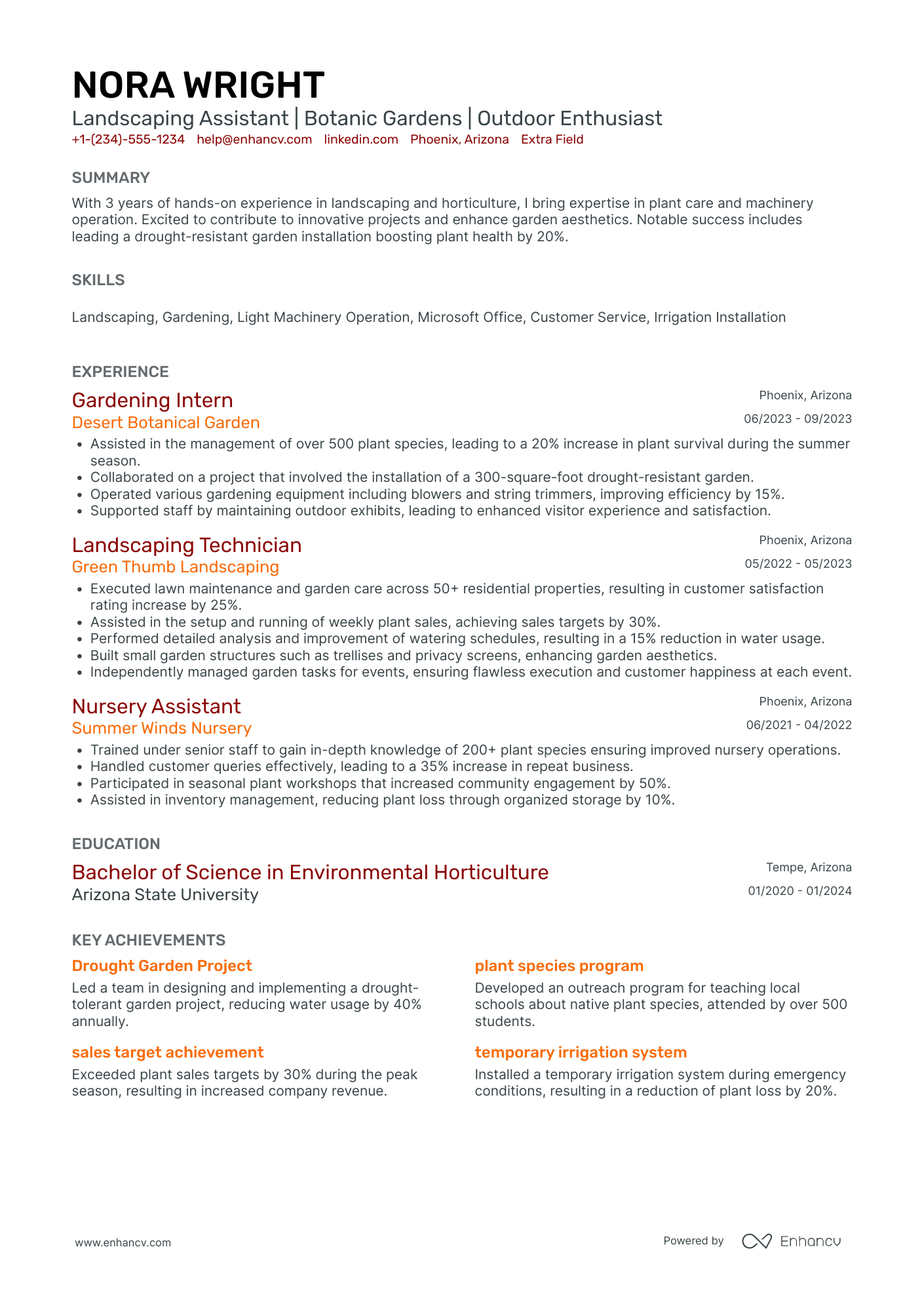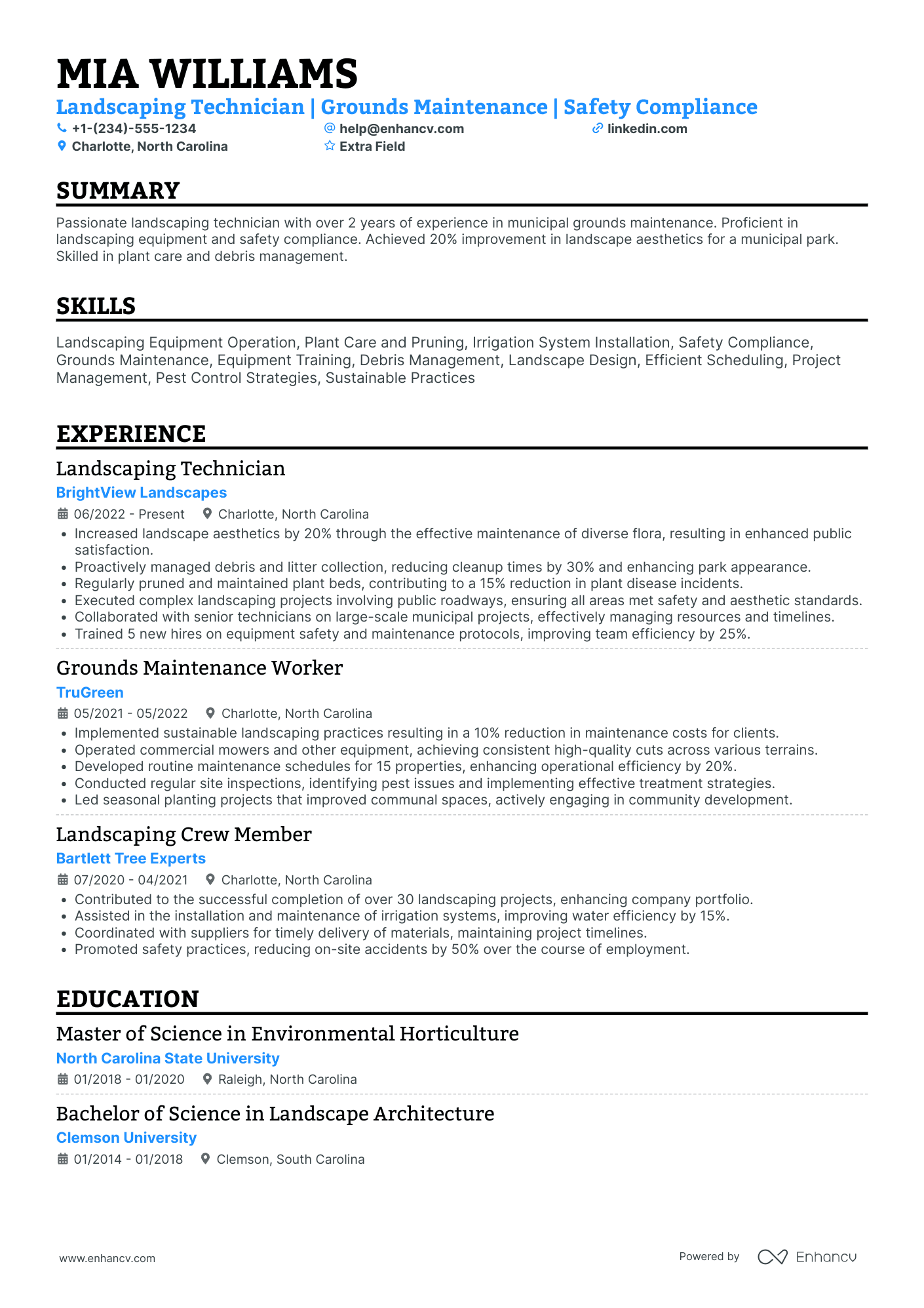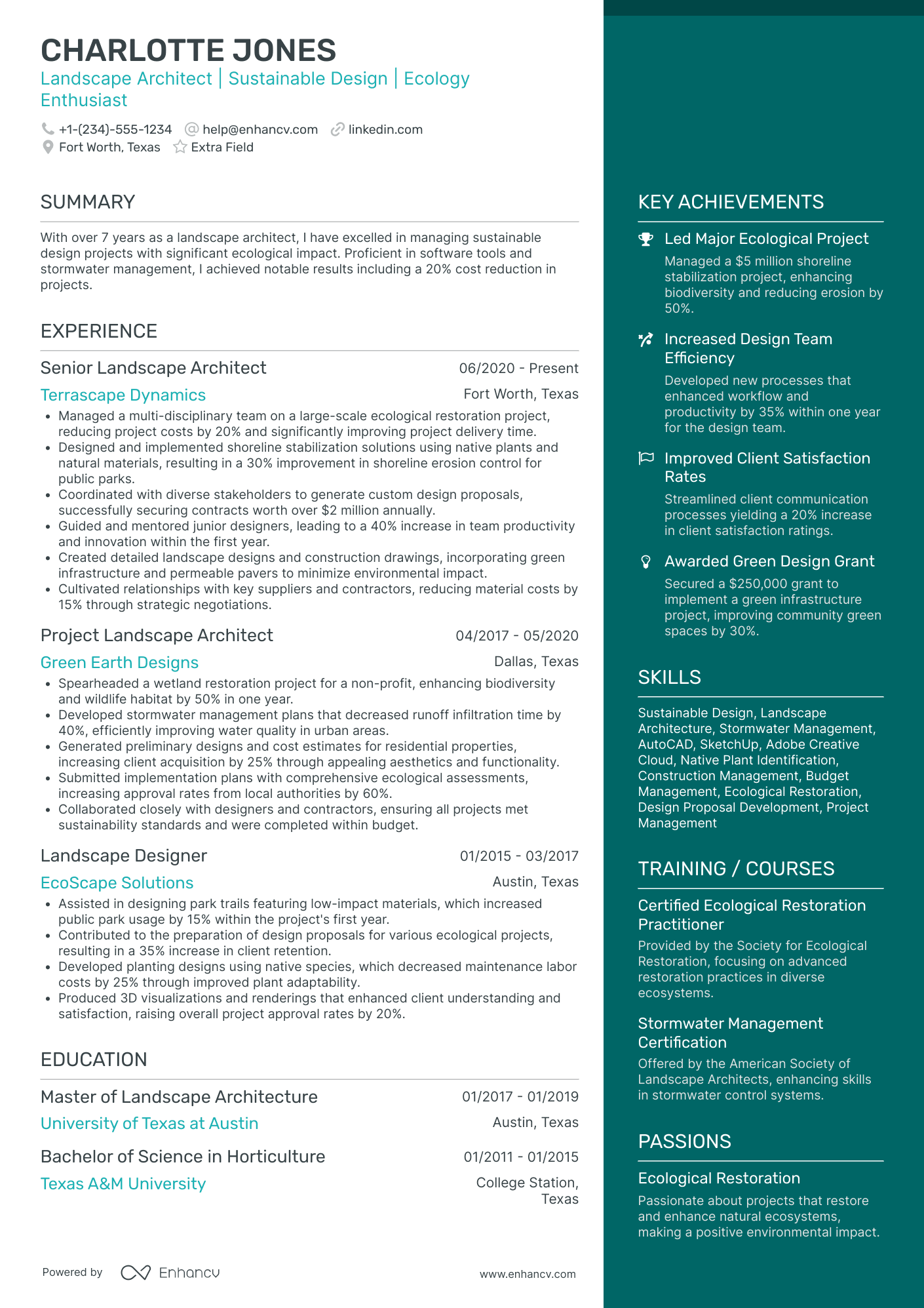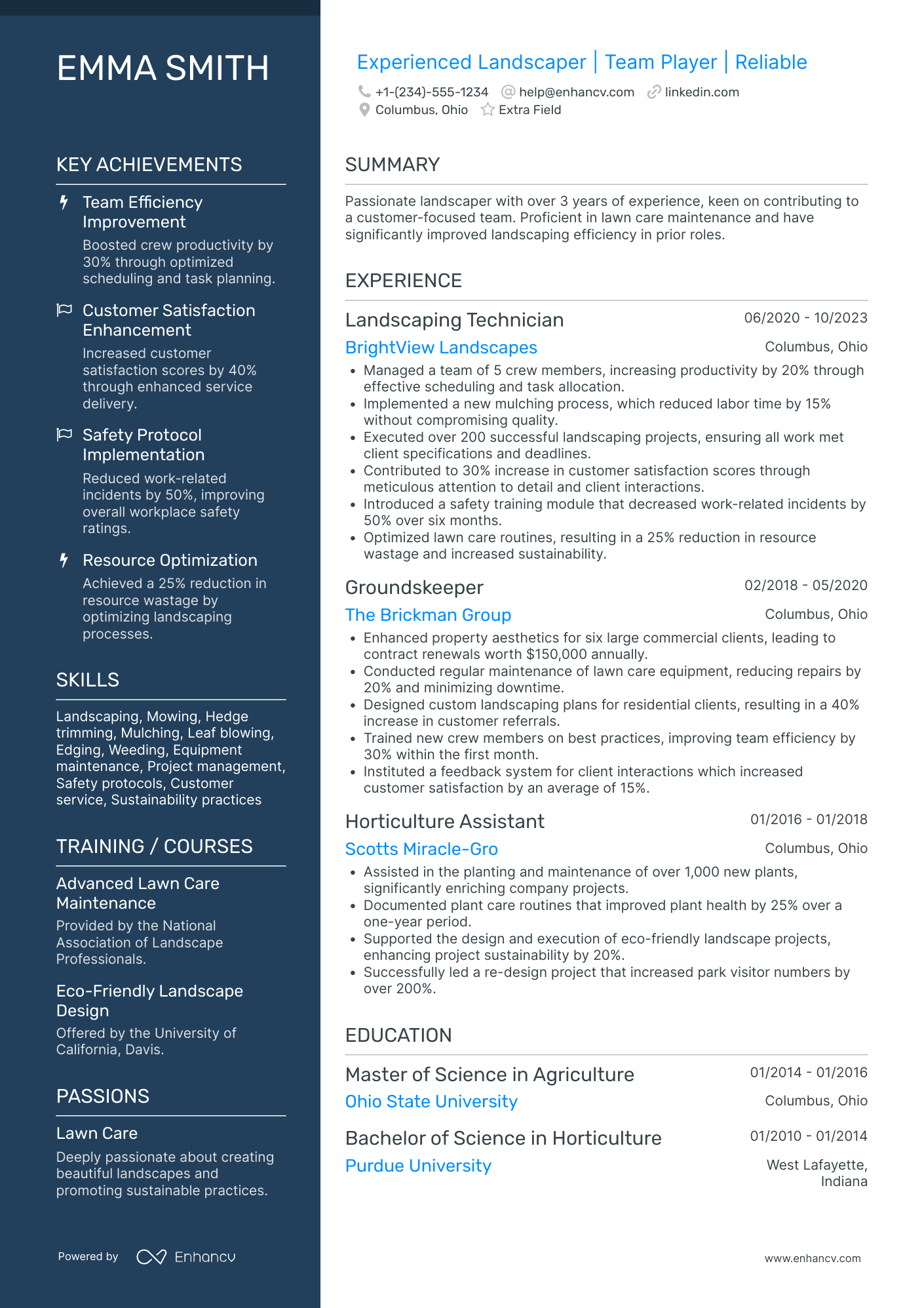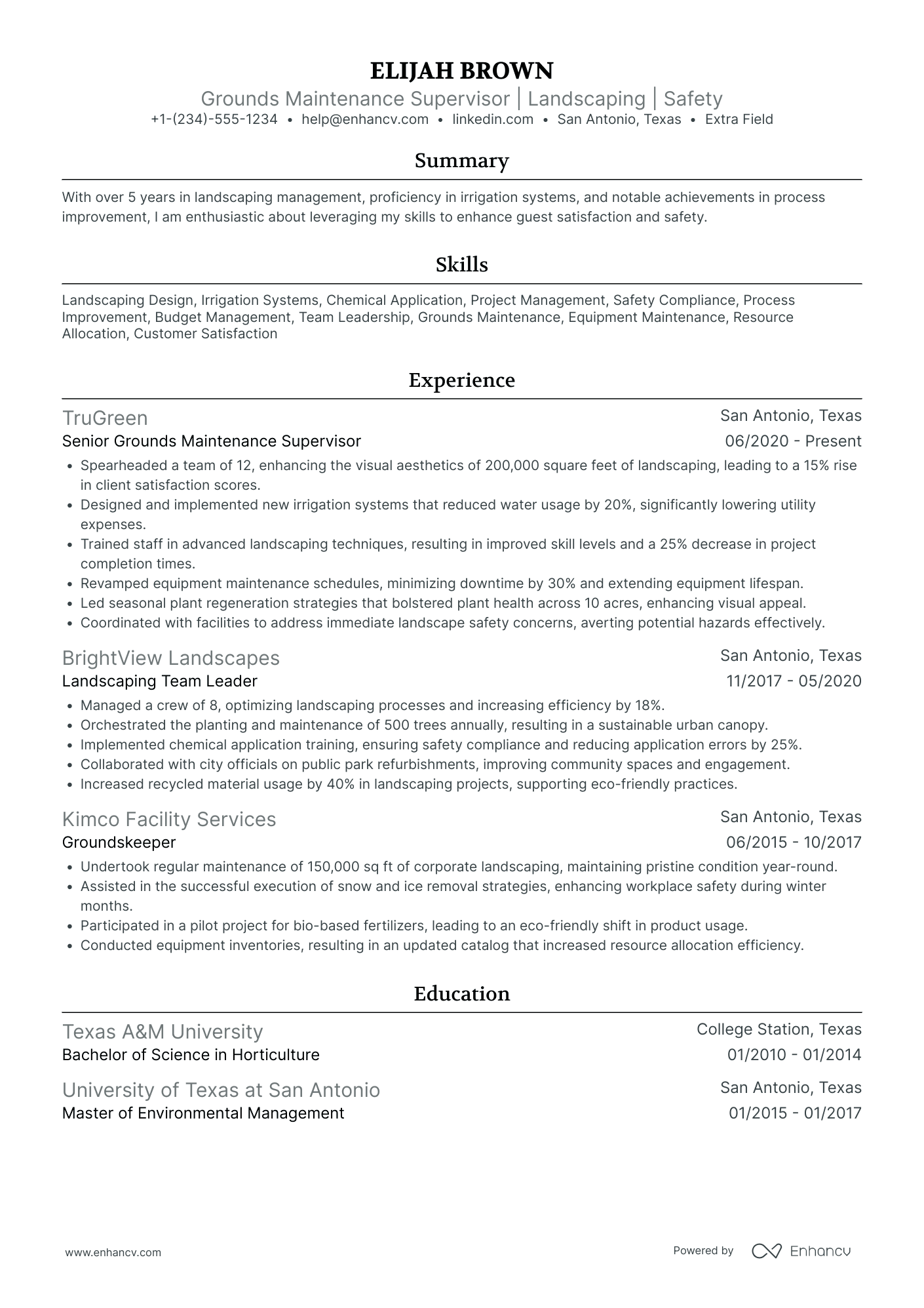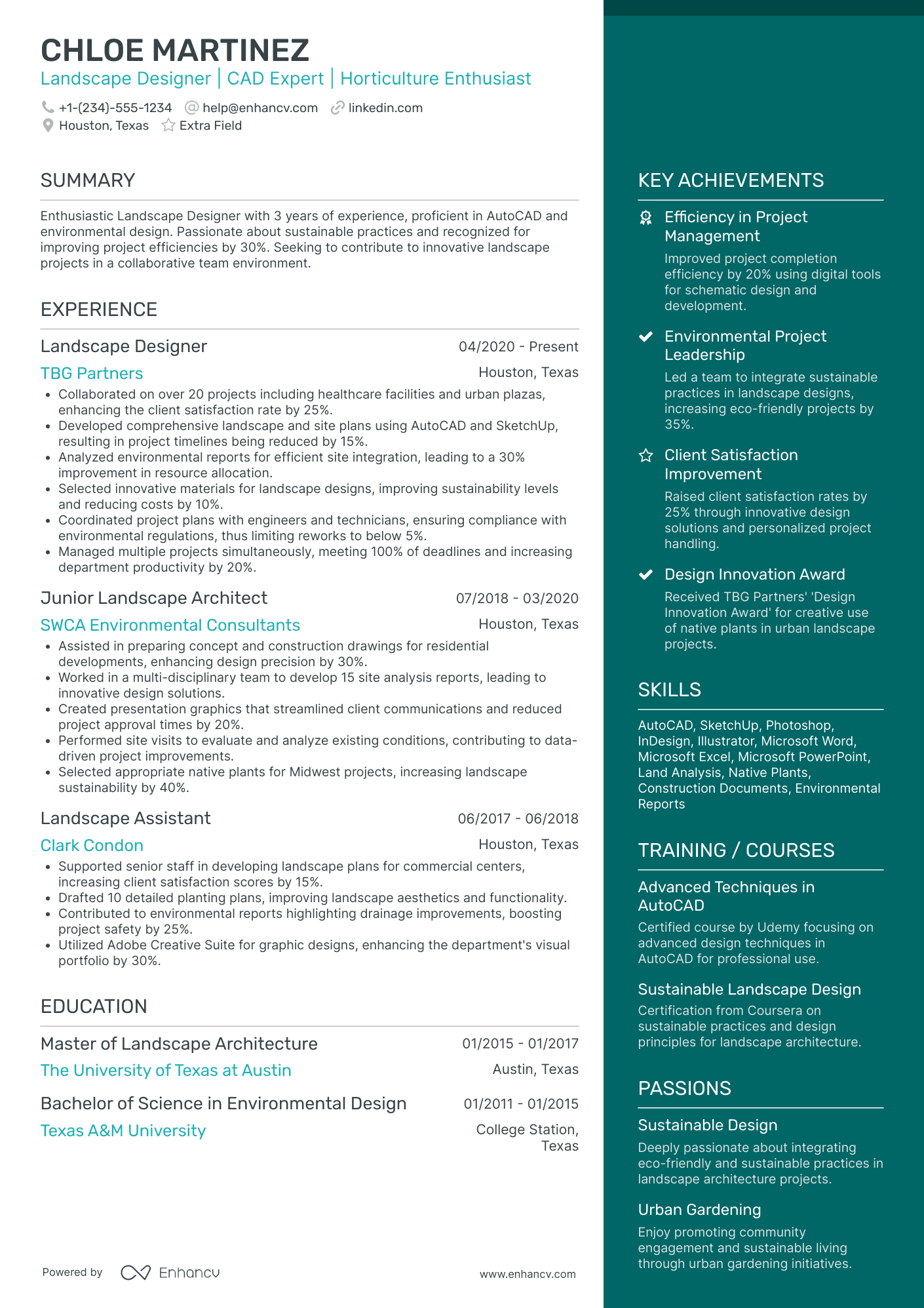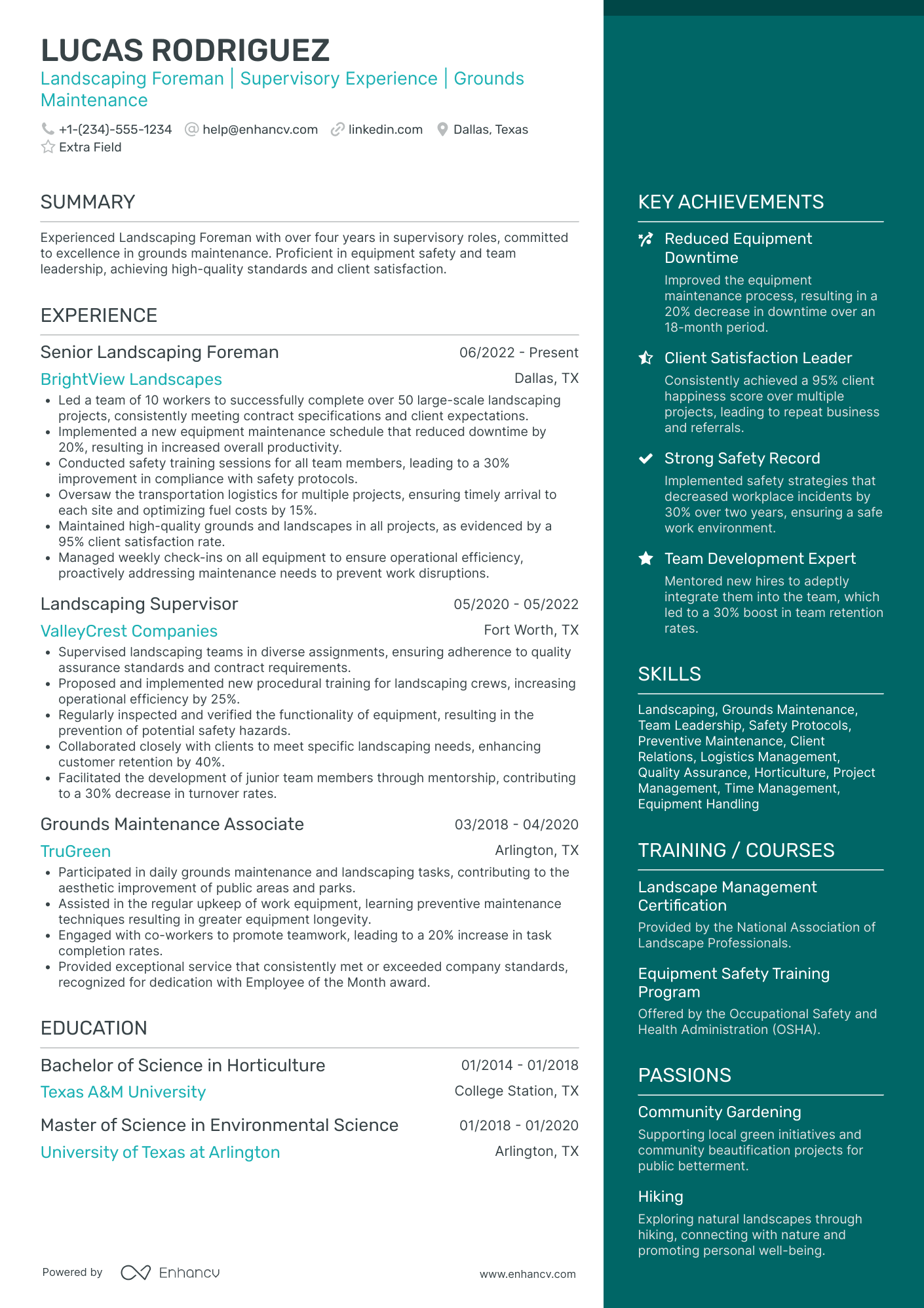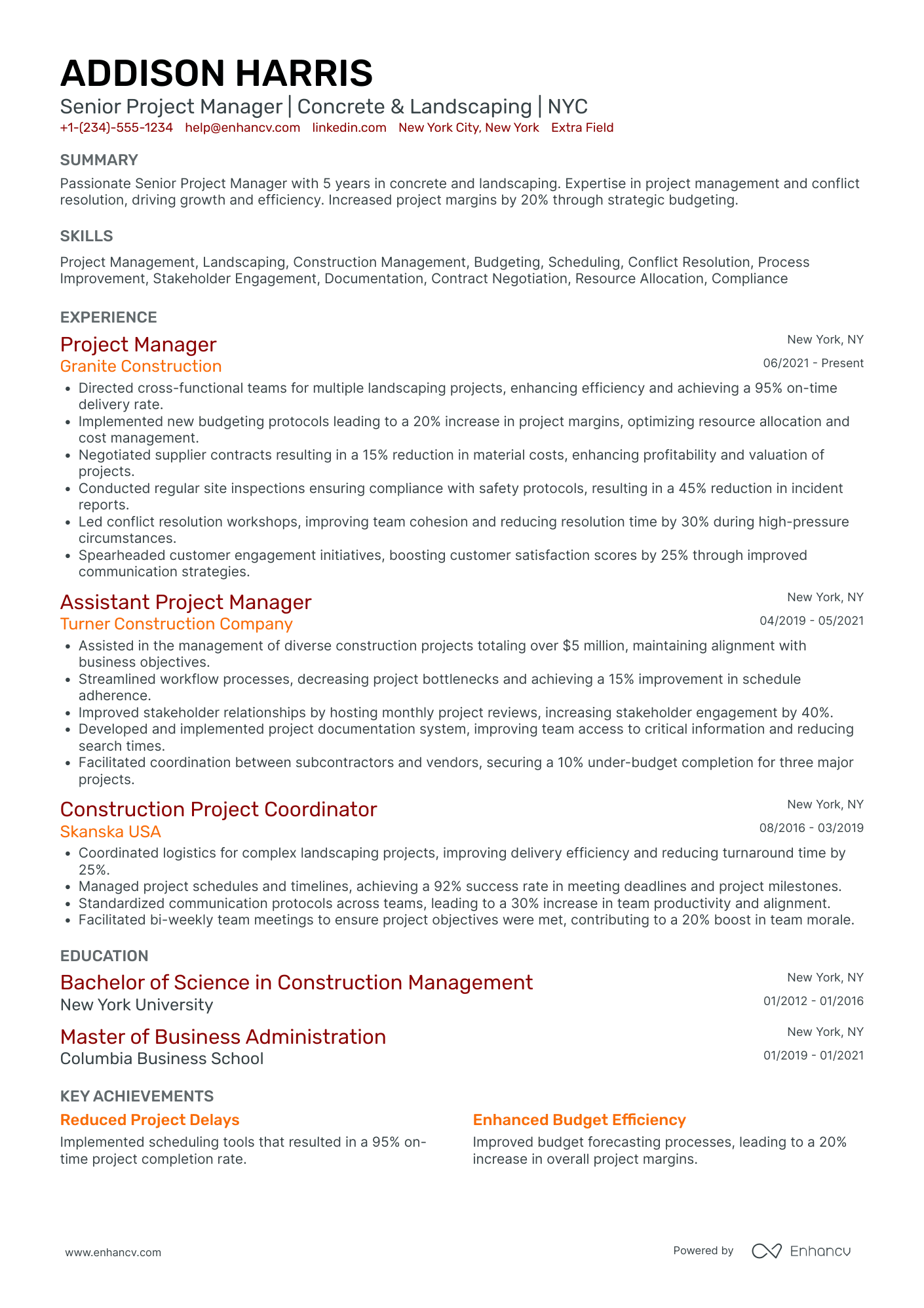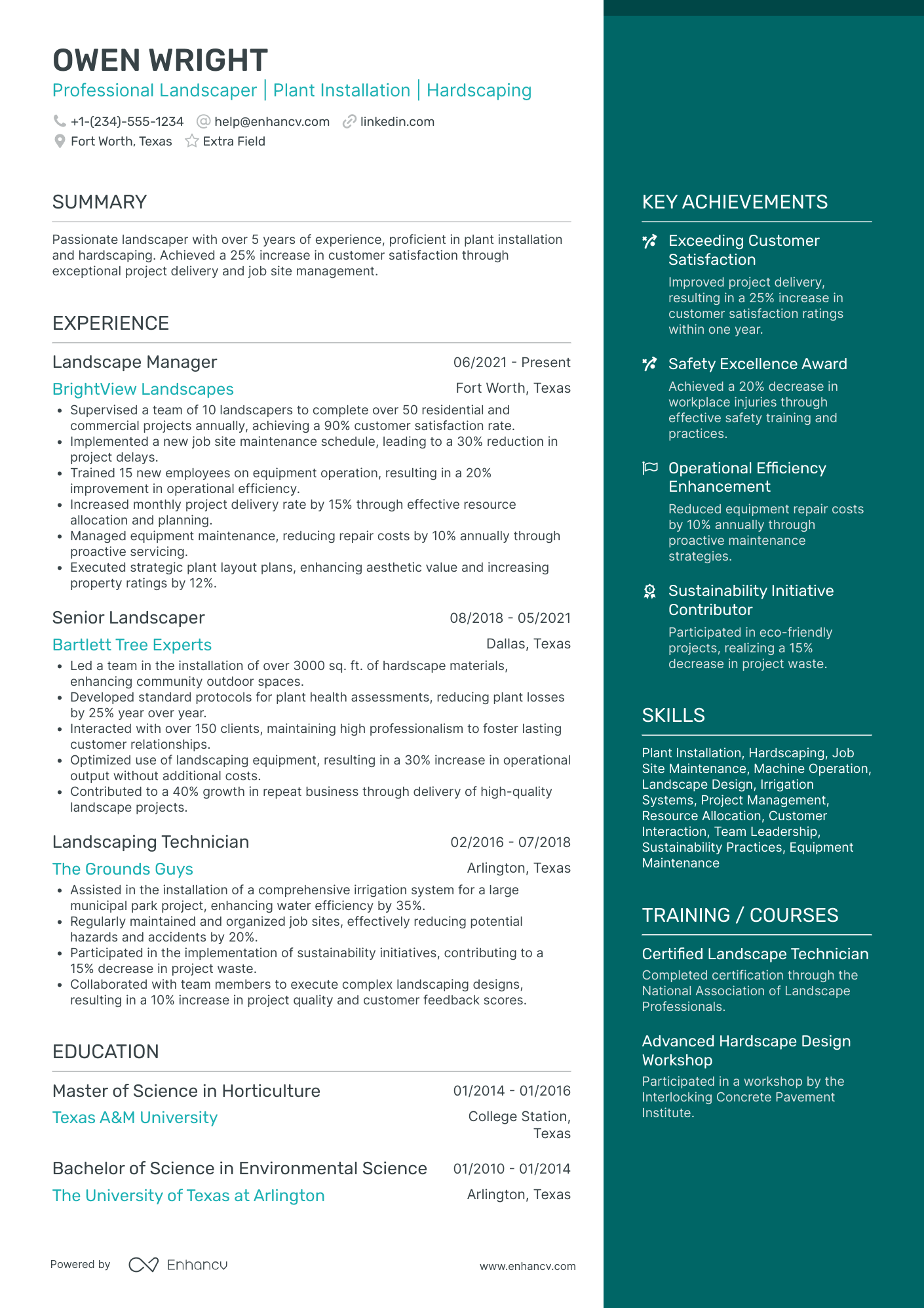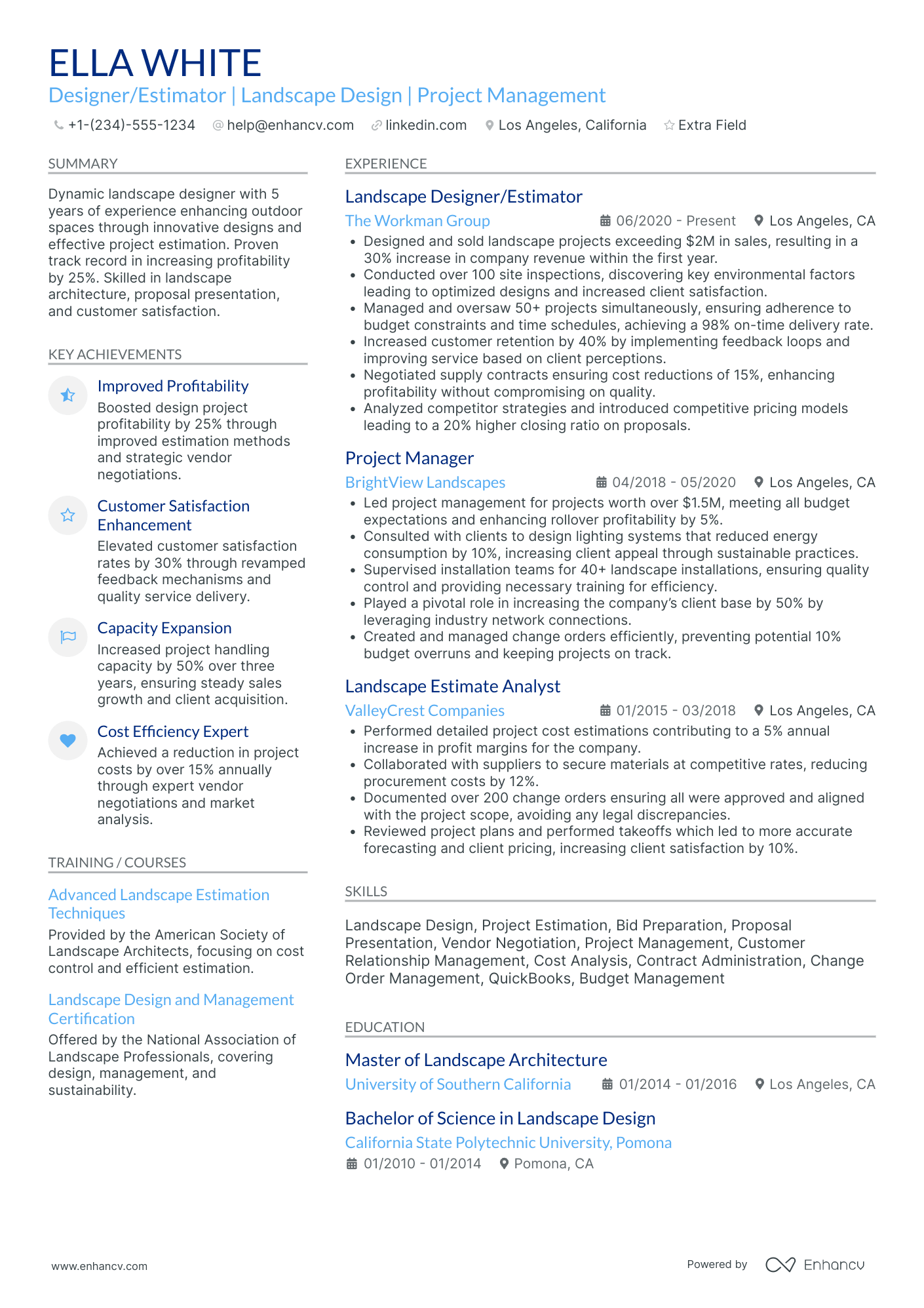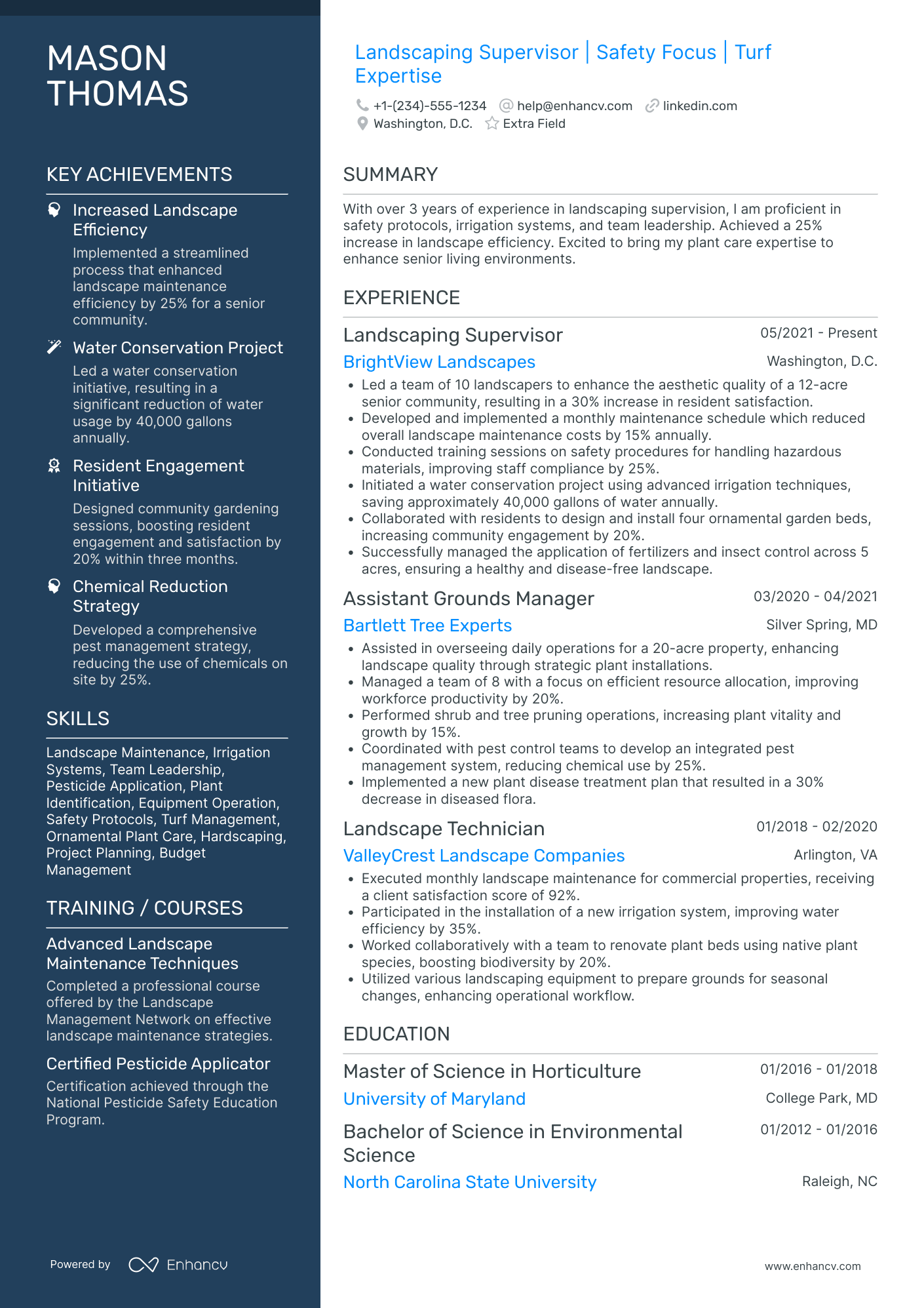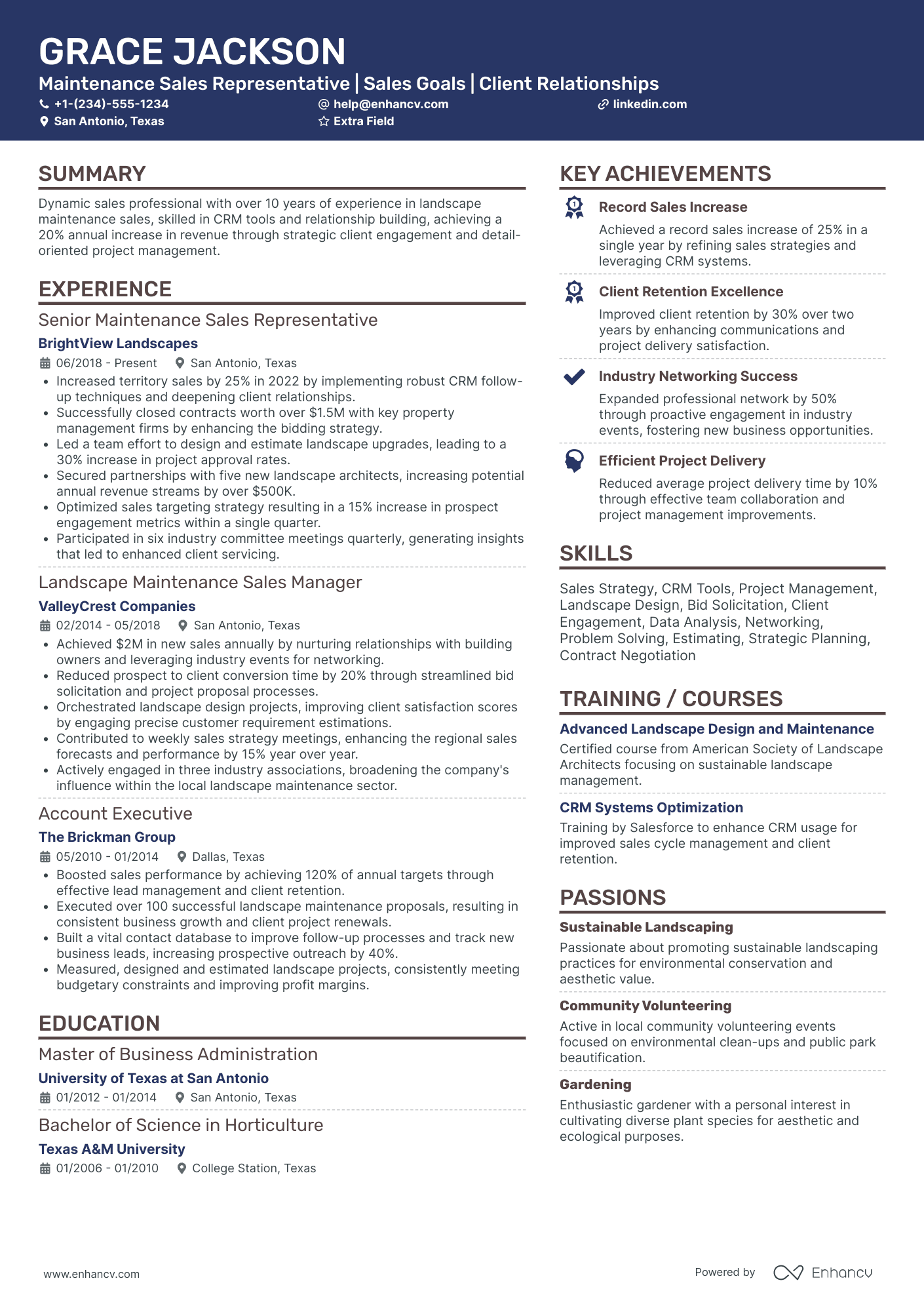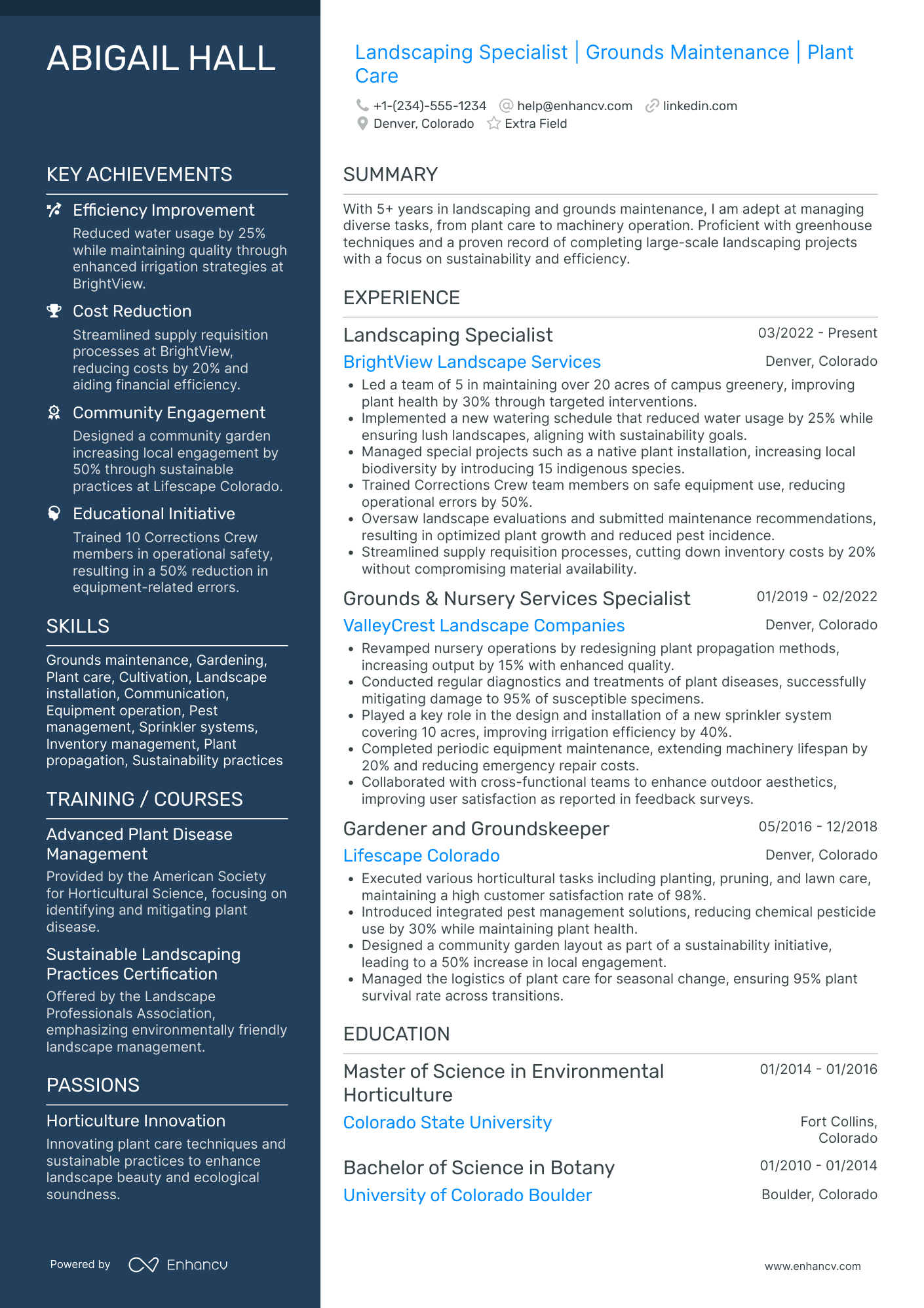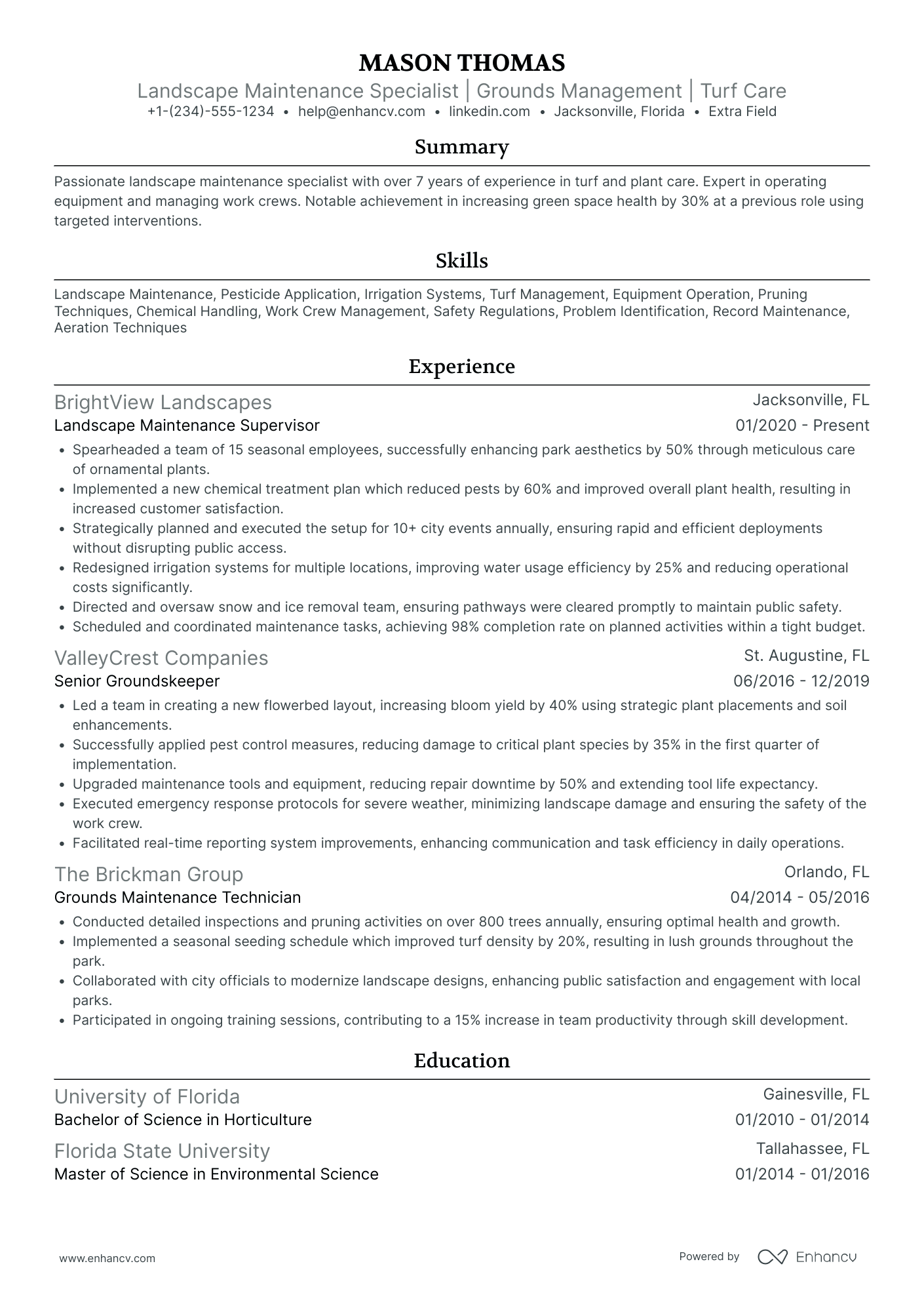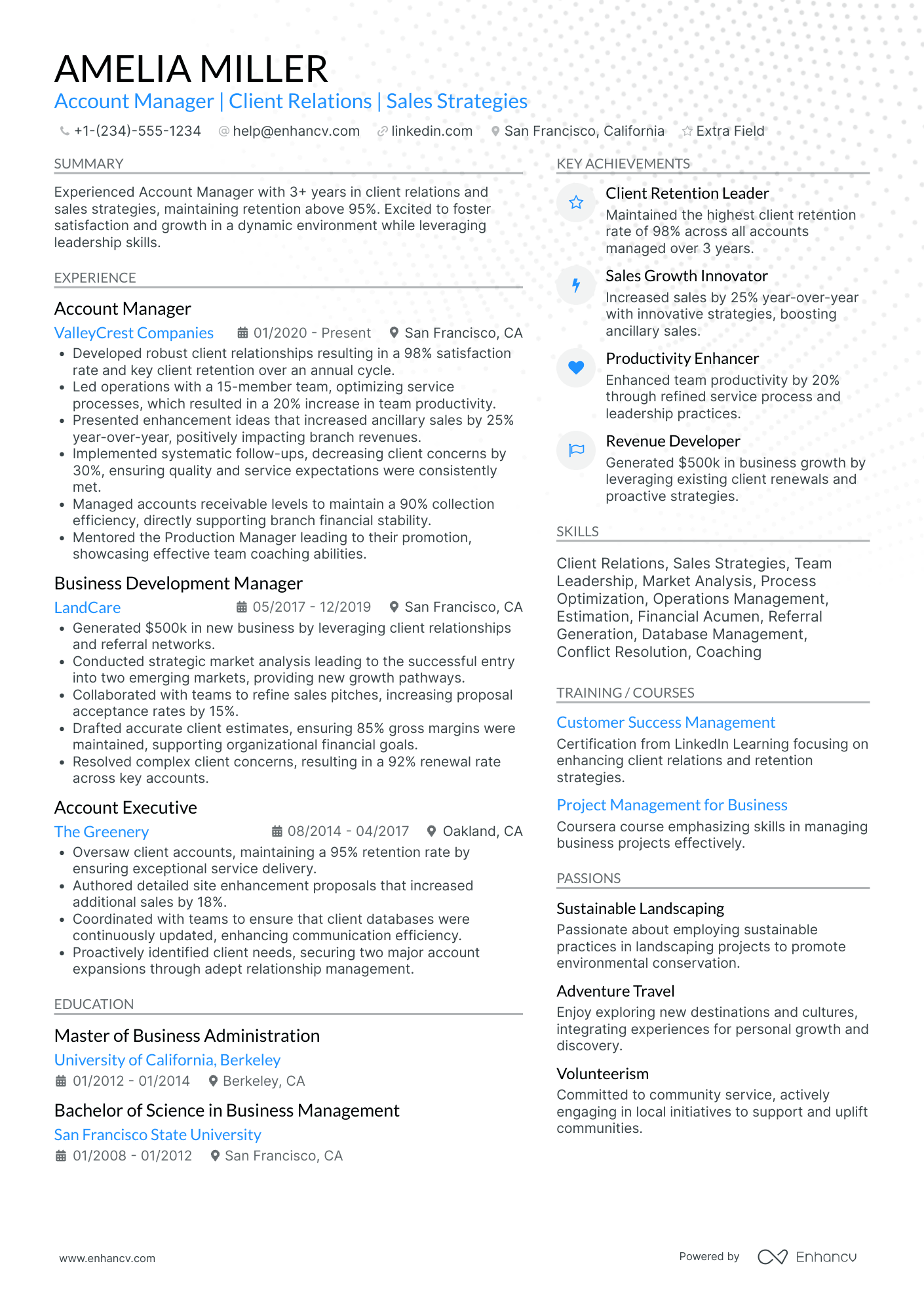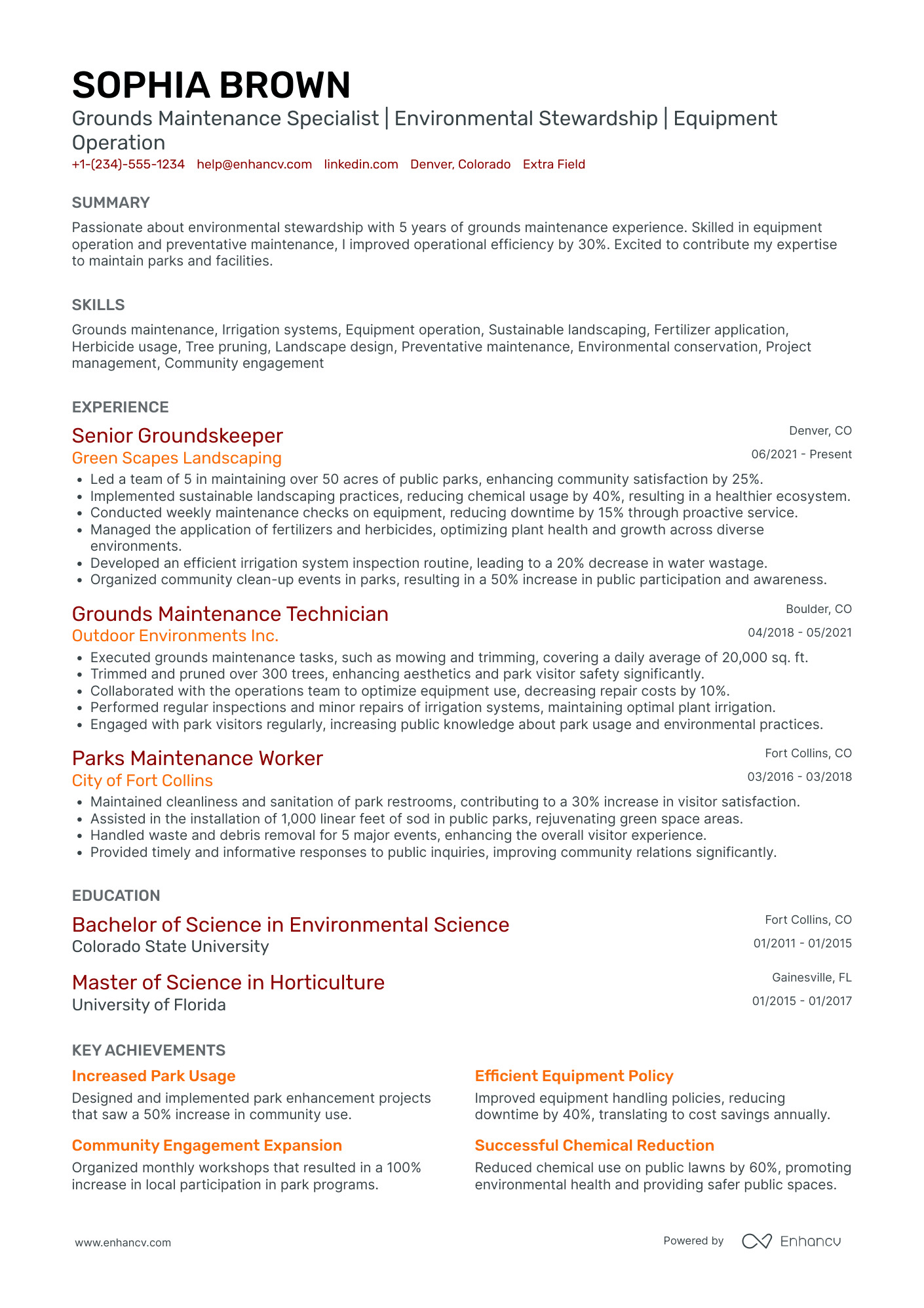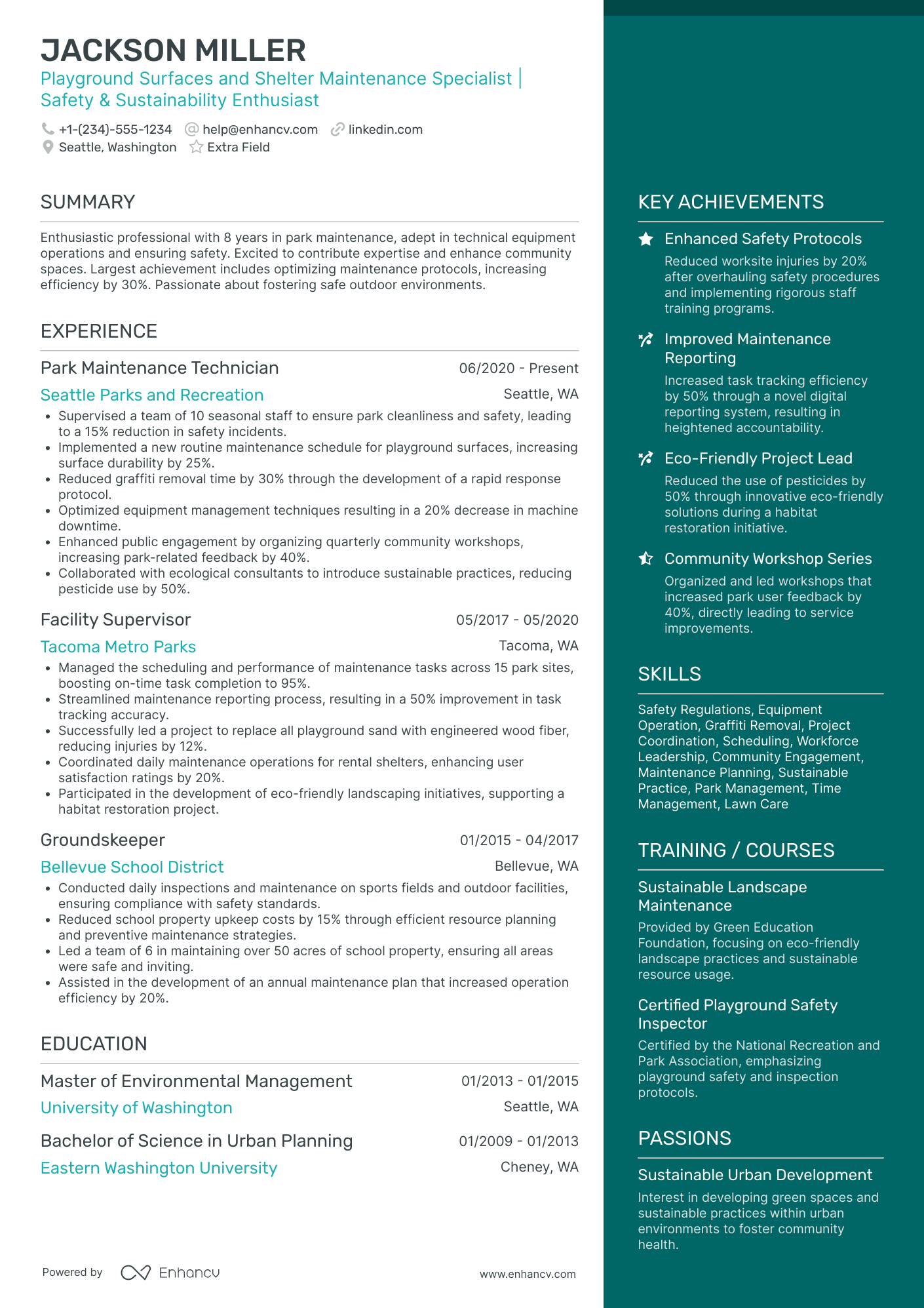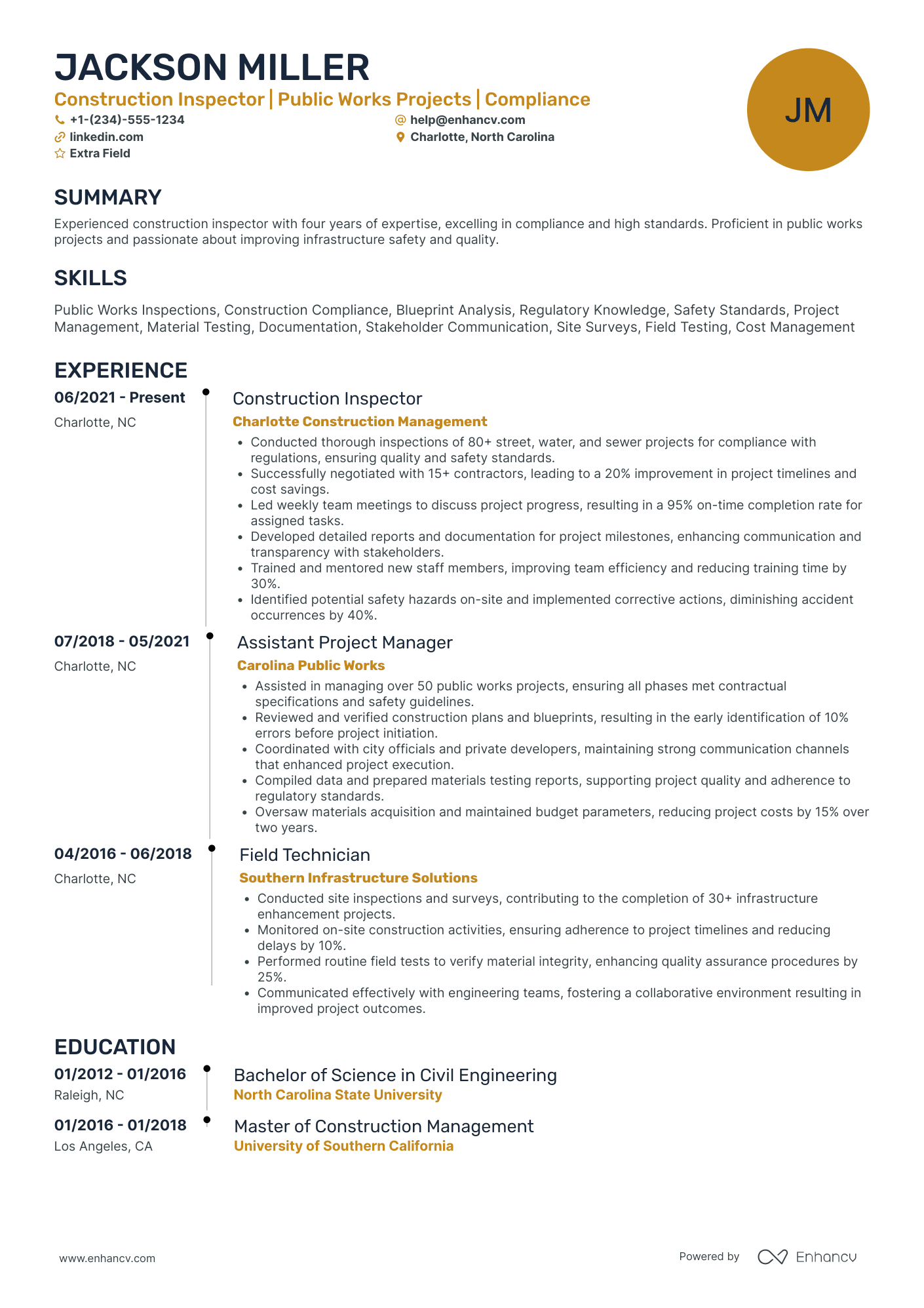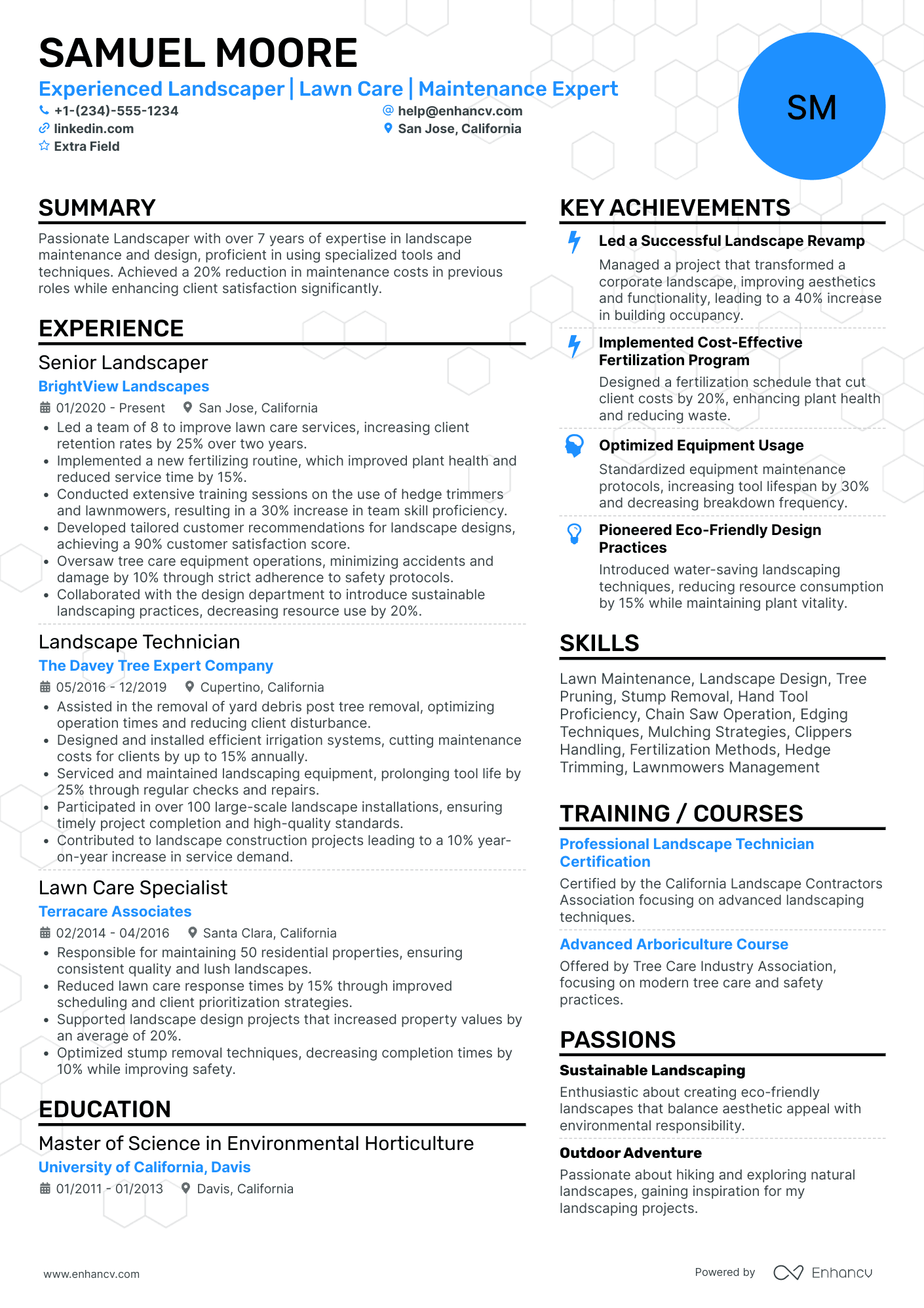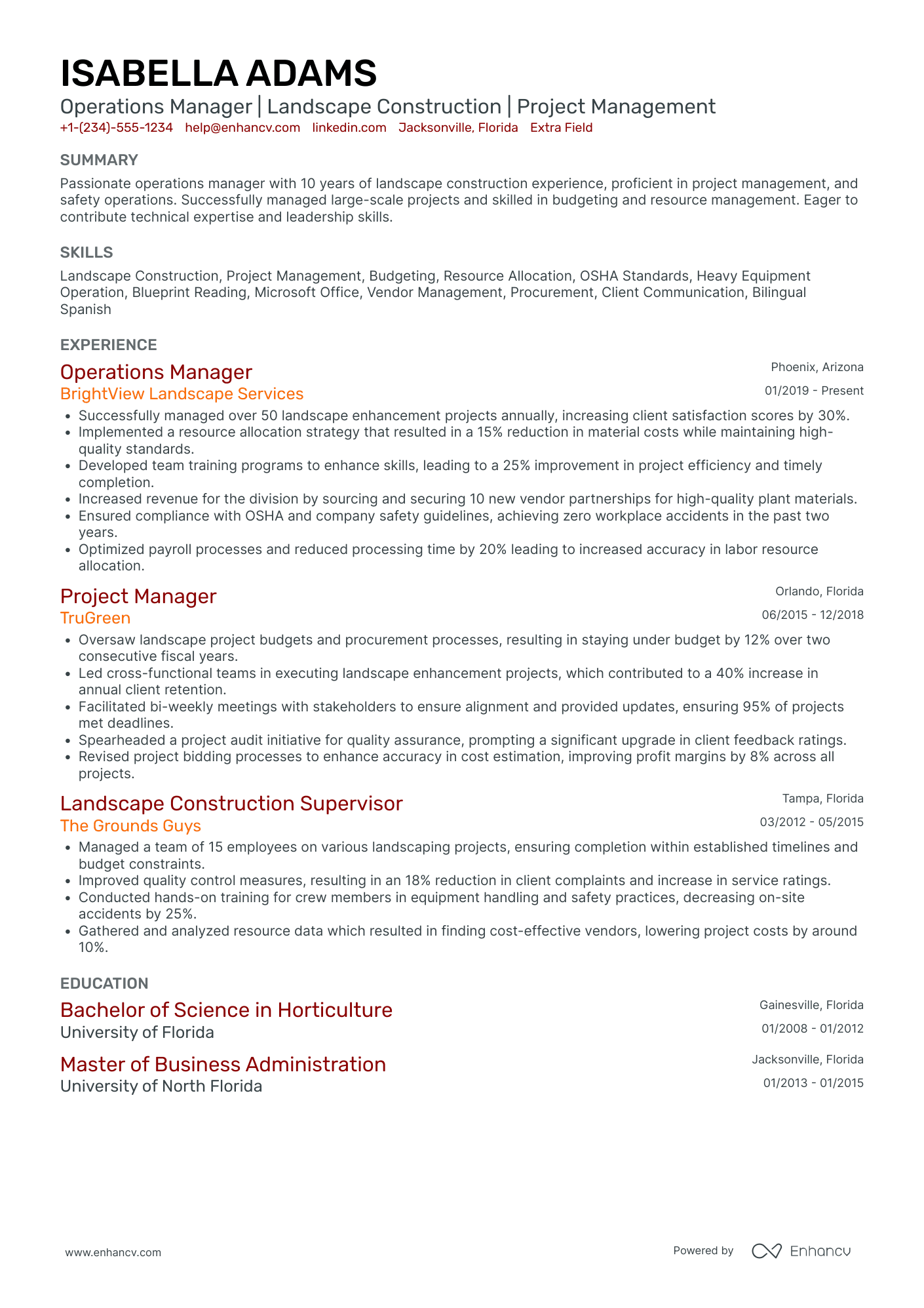Many landscaping resume drafts fail because they list tasks and equipment but skip measurable results and site scope. That gets you filtered by ATS screening and overlooked in fast recruiter scans, especially when many candidates apply.
A strong resume shows what you improved, not just what you used. If you're unsure where to begin, learning how to write a resume from scratch can help you build that foundation. You can highlight acres maintained, crews led, on-time completions, water savings, safety record, client retention, and reduced rework from higher-quality installs.
Key takeaways
- Quantify landscaping results—properties maintained, water savings, crew size—instead of listing generic duties.
- Use reverse-chronological format for experienced landscapers and hybrid format for career changers or juniors.
- Tailor every resume to the job posting by mirroring specific equipment, methods, and certifications listed.
- Place certifications like pesticide applicator licenses and OSHA training where recruiters expect them—near education.
- Tie each skill to a measurable outcome in your experience bullets, not just in a standalone list.
- Use Enhancv to turn vague task descriptions into specific, recruiter-ready resume bullets faster.
- Write a three- to four-line summary stating your specialty, tools, and one quantified achievement upfront.
Job market snapshot for landscapings
We analyzed 968 recent landscaping job ads across major US job boards. These numbers help you understand employment type trends, experience requirements, industry demand at a glance.
What level of experience employers are looking for landscapings
| Years of Experience | Percentage found in job ads |
|---|---|
| 1–2 years | 14.4% (139) |
| 3–4 years | 4.9% (47) |
| 5–6 years | 1.9% (18) |
| 7–8 years | 1.0% (10) |
| 9–10 years | 0.4% (4) |
| 10+ years | 27.8% (269) |
| Not specified | 49.3% (477) |
Landscaping ads by area of specialization (industry)
| Industry (Area) | Percentage found in job ads |
|---|---|
| Finance & Banking | 68.5% (663) |
| Education | 10.5% (102) |
| Healthcare | 9.2% (89) |
| Manufacturing | 3.3% (32) |
| Government | 3.1% (30) |
| Retail & E-commerce | 2.4% (23) |
Top companies hiring landscapings
| Company | Percentage found in job ads |
|---|---|
| BrightView Landscapes, LLC | 41.2% (399) |
| PBS Engineering and Environmental Inc. | 5.5% (53) |
| Davey Tree | 5.0% (48) |
| DJ's Landscape Management | 2.3% (22) |
| Kimley-Horn and Associates, Inc. | 2.2% (21) |
| Actalent | 1.9% (18) |
| CW Resources, Inc. | 1.1% (11) |
Role overview stats
These tables show the most common responsibilities and employment types for landscaping roles. Use them to align your resume with what employers expect and to understand how the role is structured across the market.
Day-to-day activities and top responsibilities for a landscaping
| Responsibility | Percentage found in job ads |
|---|---|
| Landscaping | 14.2% (137) |
| Landscape maintenance | 12.4% (120) |
| Pruning | 12.1% (117) |
| Mulching | 10.8% (105) |
| Equipment operation | 10.6% (103) |
| Autocad | 10.2% (99) |
| Weeding | 9.2% (89) |
| Equipment maintenance | 8.3% (80) |
| Sketchup | 8.1% (78) |
| Mowing | 8.0% (77) |
| Planting | 7.1% (69) |
| Power mowers | 6.8% (66) |
How to format a landscaping resume
Recruiters reviewing landscaping resumes prioritize hands-on skills, relevant certifications, and demonstrated ability to manage outdoor projects from start to finish. Choosing the right resume format ensures these signals appear early and clearly, improving both recruiter engagement and applicant tracking system (ATS) readability.
I have significant experience in this role—which format should I use?
Use a reverse-chronological format to put your strongest, most recent landscaping experience front and center. Do:
- Lead with your most recent positions, highlighting the scope of projects you managed—crew size, property types, and client volume.
- Feature role-specific skills and tools such as irrigation system installation, hardscape design, pesticide application licensing, and landscape CAD software.
- Quantify outcomes and business impact wherever possible, including cost savings, client retention rates, and project completion metrics.
I'm junior or switching into this role—what format works best?
A hybrid format works best because it lets you lead with relevant landscaping skills while still showing a clear work timeline. Do:
- Place a dedicated skills section near the top of your resume, listing technical abilities like mowing equipment operation, plant identification, soil grading, and irrigation repair.
- Include hands-on projects, volunteer work, or transitional experience—such as personal landscaping projects, agricultural coursework, or grounds maintenance internships—to demonstrate applied knowledge.
- Connect every action to a result, even at a small scale, so recruiters can see your ability to deliver measurable outcomes.
Why not use a functional resume?
A functional format strips away the work timeline recruiters rely on to assess your hands-on landscaping experience, making it harder for them to verify where and how you developed your skills.
- Edge-case exception: A functional resume may be acceptable if you're transitioning from a related trade (such as agriculture, construction, or groundskeeping), have limited formal work history, or need to address significant resume gaps—but only if every skill listed is tied directly to specific projects, certifications, or measurable outcomes.
Once you've settled on a format that highlights your strengths, it's time to fill it with the right sections to give hiring managers a complete picture of your qualifications.
What sections should go on a landscaping resume
Recruiters expect a clean, easy-to-scan resume that highlights your landscaping experience, core skills, and safety credentials. Understanding which resume sections to include ensures you don't miss anything critical.
Use this structure for maximum clarity:
- Header
- Summary
- Experience
- Skills
- Projects
- Education
- Certifications
- Optional sections: Awards, Volunteering, Languages
Your experience bullets should emphasize measurable results, job scope, equipment and crew responsibility, safety compliance, and on-time, on-budget outcomes.
Is your resume good enough?
Drop your resume here or choose a file. PDF & DOCX only. Max 2MB file size.
Once you’ve organized your resume with the right structure and key details, the next step is to write your landscaping experience section so it fits that format and clearly supports your application.
How to write your landscaping resume experience
Your experience section should highlight the landscaping projects you've completed, the tools and techniques you used to execute them, and the measurable results those efforts produced. Hiring managers in landscaping prioritize demonstrated impact—healthier lawns maintained, properties transformed, clients retained—over generic task lists that simply describe daily duties. Building a targeted resume that speaks directly to each employer's needs makes your experience section far more effective.
Each entry should include:
- Job title
- Company and location (or remote)
- Dates of employment (month and year)
Three to five concise bullet points showing what you owned, how you executed, and what outcomes you delivered:
- Ownership scope: the specific properties, grounds, client accounts, crew teams, or project portfolios you were directly responsible for managing and maintaining.
- Execution approach: the equipment, irrigation systems, hardscaping techniques, horticultural methods, or seasonal maintenance plans you applied to complete landscaping work on time and to standard.
- Value improved: the changes you drove in property appearance, plant health, water efficiency, soil quality, safety compliance, or operational turnaround time across your landscaping projects.
- Collaboration context: how you coordinated with property managers, homeowners, nursery suppliers, subcontractors, or municipal agencies to align on project scope, timelines, and design expectations.
- Impact delivered: the outcomes your work produced—expressed through client retention, service area growth, cost reductions, crew productivity gains, or expanded contract volume—rather than a simple list of tasks performed.
Experience bullet formula
A landscaping experience example
✅ Right example - modern, quantified, specific.
Landscape Crew Lead
Greenway Landscape Co. | Austin, TX
2022–Present
Full-service residential and commercial landscaping provider serving 120+ active properties across Central Texas.
- Led a four-person crew using Aspire scheduling, ArcGIS site maps, and GPS route planning to complete 1,100+ service visits per season, improving on-time completion from 88% to 96%.
- Installed drip irrigation and smart controllers (Hunter Hydrawise, Rain Bird) using pressure testing and zone audits, reducing water use by 18% across twenty-five properties while eliminating repeat leak callbacks by 30%.
- Built landscape designs and estimates in AutoCAD and Aspire with material takeoffs and unit-cost templates, cutting bid turnaround time from three days to one day and increasing close rate by 12%.
- Implemented a weekly preventive maintenance program for mowers, trimmers, and skid steers using a digital checklist in ServiceTitan, reducing equipment downtime by 22% and overtime labor by six hours per week.
- Coordinated with clients, property managers, and irrigation subcontractors to sequence hardscape installs (pavers, edging, drainage) and plantings, delivering $410K in annual project revenue with a 4.8 out of 5 client satisfaction average.
Now that you've seen how a strong experience section looks in practice, let's break down how to tailor each detail to match the specific landscaping job you're applying for.
How to tailor your landscaping resume experience
Recruiters evaluate landscaping resumes through both human review and applicant tracking systems (ATS), so your experience section needs to speak directly to the job posting. Tailoring your resume to the job description increases your chances of passing both screening layers.
Ways to tailor your landscaping experience:
- Match specific equipment and tools named in the job description.
- Use the exact plant species or turf varieties the posting references.
- Mirror irrigation systems or hardscape methods the employer specifies.
- Include pesticide licensing or safety certifications the role requires.
- Reflect crew size or project scope that aligns with their operations.
- Highlight seasonal maintenance workflows the posting emphasizes.
- Reference landscape design software the employer lists as preferred.
- Emphasize water conservation or sustainable practices when mentioned.
Tailoring means aligning your real accomplishments with each job's stated requirements, not forcing keywords where they don't belong.
Resume tailoring examples for landscaping
| Job description excerpt | Untailored | Tailored |
|---|---|---|
| "Operate and maintain commercial mowing equipment, including zero-turn mowers and string trimmers, across residential and HOA properties." | Performed various landscaping tasks using different tools and equipment. | Operated zero-turn mowers and string trimmers to maintain 45+ residential lawns and three HOA common areas on a weekly rotation schedule. |
| "Install hardscape features such as retaining walls, paver patios, and drainage systems according to project blueprints." | Helped with outdoor construction and installation projects as needed. | Built segmental retaining walls and installed 1,200+ sq. ft. of paver patios per project, following engineered blueprints and integrating French drain systems to meet grading specifications. |
| "Apply fertilizers, herbicides, and pest control treatments in compliance with state pesticide regulations and IPM principles." | Applied chemicals and treatments to lawns and garden areas. | Applied granular fertilizers and selective herbicides across 60+ client properties per season, holding a state-certified pesticide applicator license and following integrated pest management (IPM) protocols to reduce chemical use by 20%. |
Once you’ve aligned your experience with the role’s priorities, quantify your landscaping achievements to show the measurable impact of that work.
How to quantify your landscaping achievements
Quantifying your achievements proves you deliver results, not just effort. Track cycle time, quality scores, safety outcomes, costs, and revenue impact across properties, crews, and seasons.
Quantifying examples for landscaping
| Metric | Example |
|---|---|
| Cycle time | "Reduced weekly mow-and-edge time from 6.5 to 5 hours per 12-acre site by standardizing routes and using a 60-inch zero-turn mower." |
| Quality score | "Improved client inspection scores from 3.8 to 4.6 out of 5 across 18 properties by tightening trim lines and using a checklist in Jobber." |
| Cost savings | "Cut seasonal mulch spend by 12% ($4,200) for three commercial sites by right-sizing orders and negotiating bulk delivery with the supplier." |
| Safety risk | "Achieved 180 days with zero recordable incidents for a four-person crew by enforcing PPE checks and documenting hazards in weekly tailgate talks." |
| Revenue growth | "Won $28,000 in new annual maintenance contracts by upselling aeration and overseeding packages to eight existing HOA clients." |
Turn vague job duties into measurable, recruiter-ready resume bullets in seconds with Enhancv's Bullet Point Generator.
Once you've crafted strong bullet points for your experience section, you'll want to apply that same precision to presenting your hard and soft skills throughout your landscaping resume.
How to list your hard and soft skills on a landscaping resume
Your skills section shows you can maintain properties safely and efficiently, and recruiters and an ATS (applicant tracking system) scan this section to match you to the job post—aim for a mix weighted toward hard skills, equipment, and safety skills with role-specific soft skills. landscaping roles require a blend of:
- Product strategy and discovery skills.
- Data, analytics, and experimentation skills.
- Delivery, execution, and go-to-market discipline.
- Soft skills.
Your skills section should be:
- Scannable (bullet-style grouping).
- Relevant to the job post.
- Backed by proof in experience bullets.
- Updated with current tools.
Place your skills section:
- Above experience if you're junior or switching careers.
- Below experience if you're mid/senior with strong achievements.
Hard skills
- Lawn mowing, striping patterns
- String trimmer, edger operation
- Zero-turn mower operation
- Chainsaw operation
- Hedge trimmer, pruning saw
- Pruning, plant health care
- Irrigation system repair, drip lines
- Sprinkler controller programming
- Mulching, bed edging
- Soil amendment, fertilization rates
- Herbicide and pesticide application (EPA label compliance)
- Hardscape installation: pavers, retaining walls
Soft skills
- Prioritize routes and daily tasks
- Follow work orders accurately
- Communicate with homeowners on-site
- Coordinate with crew leads
- Flag hazards and stop unsafe work
- Document issues with photos and notes
- Manage time across multiple properties
- Adjust plan for weather changes
- Handle client feedback professionally
- Maintain equipment checklists consistently
- Keep job sites clean and organized
- Escalate scope changes quickly
How to show your landscaping skills in context
Skills shouldn't live only in a bulleted list on your resume. Explore common resume skills to see how professionals across industries present their abilities effectively.
They should be demonstrated in:
- Your summary (high-level professional identity)
- Your experience (proof through outcomes)
Here's how that looks in practice.
Summary example
Senior landscape professional with 12 years of experience in sustainable site design, irrigation management, and crew leadership. Skilled in AutoCAD and xeriscaping methods. Reduced client water usage by 35% across 60+ residential and commercial projects.
- Reflects senior-level expertise immediately
- Names industry-relevant tools and methods
- Includes a specific, measurable outcome
- Signals client-facing communication skills
Experience example
Senior Landscape Designer
Greenstone Landscapes | Denver, CO
March 2018–Present
- Designed 80+ drought-resistant landscapes using AutoCAD and native planting strategies, cutting average irrigation costs by 30%.
- Collaborated with architects and property managers to deliver phased commercial installations, completing 95% of projects on schedule.
- Trained and supervised a crew of six technicians on sustainable grading techniques, reducing soil erosion complaints by 40%.
- Every bullet includes measurable proof
- Skills appear naturally through real outcomes
Once you’ve tied your landscaping abilities to real outcomes and responsibilities, the next step is applying that approach to a landscaping resume with no experience so you can highlight what you’ve done without relying on past job titles.
How do I write a landscaping resume with no experience
Even without full-time experience, you can demonstrate readiness through:
- Yard work for neighbors
- Community garden volunteer maintenance
- School grounds cleanup projects
- Personal lawn care routine
- Seasonal snow removal services
- Home irrigation setup practice
- Tool handling safety training
- Nursery or garden center shifts
If you're starting out, our guide on writing a resume without work experience walks you through strategies that apply directly to landscaping.
Focus on:
- Tools used and maintained
- Quantified results per project
- Safety practices and compliance
- Reliable schedule and availability
Resume format tip for entry-level landscaping
Use a combination resume format because it highlights skills and projects first, while still showing work history, even if it is unrelated. Do:
- Lead with a skills section: mowing, edging, pruning.
- Add a projects section with metrics.
- List tools you used: string trimmer, blower.
- Include safety training and equipment care.
- Tailor keywords to each job post.
- Completed weekly yard work for three neighbors using string trimmer, rake, and blower, reducing leaf buildup by 80 percent across four properties in six weeks.
Even without formal work history, your education section can demonstrate relevant knowledge and training that strengthens your candidacy.
How to list your education on a landscaping resume
Your education section helps hiring managers confirm you have foundational knowledge in horticulture, plant science, or landscape design. It validates your technical training for landscaping roles.
Include:
- Degree name
- Institution
- Location
- Graduation year
- Relevant coursework (for juniors or entry-level candidates)
- Honors & GPA (if 3.5 or higher)
Skip month and day details—list the graduation year only.
Here's a strong education entry tailored for a landscaping resume.
Example education entry
Bachelor of Science in Horticulture
Oregon State University, Corvallis, OR
2021 | GPA: 3.7
- Relevant Coursework: Landscape Design, Soil Science, Irrigation Systems, Plant Pathology, and Sustainable Land Management
- Honors: Dean's List, 2019–2021
How to list your certifications on a landscaping resume
Certifications show you keep learning, handle landscaping tools safely, and stay current with industry standards. They also help employers trust your skills when your experience level varies.
Include:
- Certificate name
- Issuing organization
- Year
- Optional: credential ID or URL
- List certifications below education when your most recent or most relevant proof is your degree or diploma, and certifications are older or secondary.
- List certifications above education when they are recent, required for the role, or more relevant than your schooling for landscaping work.
Best certifications for your landscaping resume
- Pesticide Applicator License
- Irrigation Association Certified Irrigation Technician (CIT)
- OSHA 10-Hour Construction Safety
- National Association of Landscape Professionals Landscape Industry Certified
- International Society of Arboriculture Certified Arborist
- Certified Playground Safety Inspector (CPSI)
- Commercial Driver's License (CDL)
Once you’ve positioned your credentials where hiring managers can spot them quickly, use your landscaping resume summary to reinforce those qualifications upfront and set the tone for the rest of your resume.
How to write your landscaping resume summary
Your resume summary is the first thing a recruiter reads, so it needs to prove your value fast. A strong opening tied to landscaping signals you understand the work and can deliver results.
Keep it to three to four lines, with:
- Your title and total years of hands-on landscaping experience.
- The type of work you specialize in, such as residential maintenance, commercial grounds, or landscape installation.
- Core skills and tools like irrigation systems, hardscaping, mowing equipment, or pesticide application.
- One or two measurable results, such as properties maintained, client retention rates, or cost savings.
- Practical soft skills shown through outcomes, like crew coordination or client communication that improved satisfaction.
PRO TIP
At an entry or junior level, focus on relevant skills, certifications, and early contributions that show initiative. Highlight specific tools you've operated and tangible results from any work experience. Avoid vague phrases like "hard worker" or "passionate about the outdoors." Every word should point to what you can do on a job site.
Example summary for a landscaping
Detail-oriented landscaper with two years of experience in residential lawn care and irrigation repair. Maintained over 40 properties weekly while reducing supply costs by 15% through efficient route planning.
Optimize your resume summary and objective for ATS
Drop your resume here or choose a file.
PDF & DOCX only. Max 2MB file size.
Now that your summary captures your strongest qualifications, make sure the header above it presents your contact details correctly so hiring managers can actually reach you.
What to include in a landscaping resume header
A resume header lists your key contact details and role focus, helping landscaping recruiters spot you fast, trust your profile, and screen you accurately.
Essential resume header elements
- Full name
- Tailored job title and headline
- Location
- Phone number
- Professional email
- GitHub link
- Portfolio link
A LinkedIn link lets recruiters confirm titles, dates, and references quickly, which supports faster screening.
Don't include a photo on a landscaping resume unless the role is explicitly front-facing or appearance-dependent.
Match your headline to the exact landscaping job posting and keep your contact details consistent across every platform.
Example
Landscaping resume header
Jordan Rivera
Landscaping Crew Leader | Hardscape, Irrigation, and Commercial Grounds Maintenance
Austin, TX
(512) 555-01XX
jordan.rivera@enhancv.com
github.com/jordanrivera
yourwebsite.com
linkedin.com/in/jordanrivera
Once your contact details and role focus are clearly established at the top, you can strengthen the rest of your application by adding additional sections for landscaping resumes that highlight relevant qualifications and experience.
Additional sections for landscaping resumes
Extra resume sections help you stand out when your core qualifications match other candidates, showcasing unique strengths relevant to landscaping.
- Certifications and licenses
- Languages
- Volunteer work
- Hobbies and interests
- Awards and achievements
- Professional affiliations
Once you've strengthened your resume with relevant extra sections, the next step is pairing it with a cover letter to make an even stronger impression on hiring managers.
Do landscaping resumes need a cover letter
A cover letter isn't required for landscaping roles, but it helps when the job is competitive or the employer expects one. If you're unfamiliar with the format, start by understanding what a cover letter is and how it complements your resume. It can make a difference when your resume alone won't explain fit, context, or a transition.
Use a cover letter to add value in these situations:
- Explain role and team fit by matching your experience to the crew structure, pace, schedule, and safety expectations.
- Highlight one or two landscaping projects with outcomes, such as reduced callbacks, improved curb appeal scores, or faster job completion.
- Show you understand the property type, users, and business context, including maintenance standards, seasonal needs, and client communication.
- Address career transitions or non-obvious experience by connecting transferable skills to landscaping tasks, tools, and on-site reliability.
Drop your resume here or choose a file.
PDF & DOCX only. Max 2MB file size.
Even if you decide a cover letter adds value for the role, using AI to improve your landscaping resume helps you present your qualifications more clearly and consistently.
Using AI to improve your landscaping resume
AI can sharpen your resume's clarity, structure, and impact. It helps reword clunky bullets and highlight relevant skills. But overuse kills authenticity. Once your content feels clear and role-aligned, step away from AI. For specific prompt ideas, check out our guide on ChatGPT resume writing prompts.
Here are 10 practical prompts to strengthen specific sections of your landscaping resume:
- Strengthen your summary. "Rewrite my landscaping resume summary to highlight hands-on experience, key specialties, and measurable results in under four sentences."
- Quantify experience bullets. "Add specific metrics like square footage, crew size, or project timelines to these landscaping experience bullet points."
- Trim wordy descriptions. "Shorten each of these landscaping job descriptions to one concise, action-driven sentence without losing key details."
- Tailor skills relevance. "Review my landscaping skills section and remove entries that don't align with this specific job posting."
- Improve action verbs. "Replace weak or repeated verbs in my landscaping experience bullets with stronger, more specific alternatives."
- Clarify project details. "Rewrite this landscaping project description to clearly state scope, my role, tools used, and the final outcome."
- Align with job posting. "Compare my landscaping resume to this job description and flag missing keywords or qualifications I should address."
- Refine certifications section. "Reorganize my landscaping certifications section by relevance to the posted role, listing the most critical ones first."
- Upgrade education entries. "Rewrite my education section to emphasize coursework, training, or honors directly related to landscaping."
- Cut filler content. "Identify and remove any vague, redundant, or generic phrases across my entire landscaping resume."
Stop using AI once your resume sounds accurate, specific, and aligned with real experience. AI should never invent experience or inflate claims—if it didn't happen, it doesn't belong here.
Conclusion
A strong landscaping resume proves results with numbers, highlights role-specific skills, and stays easy to scan. Use measurable outcomes like properties maintained, crew size, safety record, on-time completion, and customer retention.
Keep your structure clear so hiring teams can find your experience fast. When your landscaping resume shows reliable performance and job-ready skills, you look prepared for today’s hiring market and the next season’s demand.
